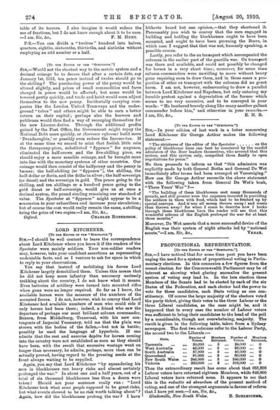LORD KITCHENER.
[To THE EDITOR OP THE "SPECTATOR.") Sin,—I should be well content to leave the correspondence about Lord Kitchener where you leave it if the readers of the Spectator were mainly soldiers. Your non-soldier readers may, however, take your confident assertions as representing undeniable facts, and so I venture to ask for space in which to reply to your observations.
You say that instead of mobilising his forces Lord Kitchener largely demobilised them. Unless this means that he did not keep more infantry than necessary uselessly trekking about the country, I do not know what it means. Even batteries of artillery were turned into mounted rifles when guns were no longer required. So far as I know, the available horses were the measure of the numbers of the mounted forces. I do not, however, wish to convey that Lord Kitchener had available numbers of men who could ride if only horses had been there ; indeed, a friend who saw the departure of perhaps our most brilliant column commander, Benson, from Middelbnrg, Transvaal, with his new con- tingents of Imperial Yeomanry, told me that the plain was strewn with the bodies of the fallen,—but not in battle; possibly he used the language of hyperbole. If one admits that the rest and exercise depths for horses coming into the country were not established as soon as they should have been, with the result that excessive wastage went on longer than necessary, he admits, perhaps, more than can be actually proved, having regard to the pressing needs at the front always waiting to be supplied.
Again, you say that Lord Kitchener "by squandering his men in blockhouses ran heavy risks and almost certainly prolonged the war." In about one and a half years, out of a total of six thousand blockhouses less than a dozen were taken 1 Should not your sentence really run : "Lord Kitchener took what some _people supposed to be great risks, but what events showed to be no risk worth talking about" P Again, how did the blockhouses prolong the war ? I have hitherto heard but one opinion,—that they shortened it Presumably you wish to convey that the men engaged in building and holding the blockhouses ought to have been mounted, and ought to have been pursuing the Boers, in which case I suggest that that was not, humanly speaking, a possible course.
Lastly, you refer to the ox transport which accompanied the columns in the earlier part of the guerilla war. Ox transport was there and available, and could not possibly be changed for horses in a very short time ; moreover, for some time column commanders were unwilling to move without heavy guns requiring oxen to draw them, and in those cases a pro- portion of other ox transport with the columns did no great harm. I am not, however, endeavouring to draw a parallel between Lord Kitchener and Napoleon, but only entering my humble protest against a. depreciation of the former which seems to me very excessive, and to be conveyed in your words : " He lumbered bravely along like many another gallant commander before him," and otherwise in your remarks.—






































 Previous page
Previous page